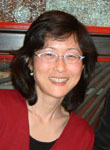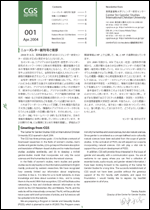s073837: David Jeffries [CGS NewsLetter 001]
 The phrase 'military prostitution' resounded across the room, across imaginations of water and of violence, around conceivable images of young soldiers and communities of women. As I listened to Professor Katherine Moon's lecture regarding this 'military prostitution' and its presence in Korea, my mind expanded. As Moon spoke, I began to stretch my imagination to picture the current situation in Iraq. My two-dimensional questions of 'what is happening with the soldiers and with the country', bends further now to gain more depth, as I begin to wonder of the perspectives of women, or of a single woman in Iraq?perspectives of which I suddenly realized I have yet to hear, or read. I began to wonder what is being negotiated beyond my non-mobilized, male imagination in spaces of women and war. Regardless of what I am able to conceive, what things might surely be happening in Iraq...in Korea...in Japan...or in my home country, the United States regarding women and prostitution? My ignorance on these issues of prostitution, and how prostitution is related to the military, humbled me as a male who dares to say that he cares for women's issues, as a male who dares to call himself a feminist in the year 2004. Far beyond this humbling, however, Professor Moon also reminded me during her lecture of my privilege as a male, a privilege that allows me to slip past the narratives of these women, whose voices compile stories that are also, in some way, relative to my own life. After all, as women, as prostitutes, as nationals, and as mothers, these women share the world with me. They are family members to others as my mother and sister are family to me. These women and myself belong to the community that I most often forget about: the international community. Listening to the voices of some of these women through Moon's lecture has brought me back to the fact that I do indeed share space with such women, and that I must, therefore, take part in these issues surrounding military prostitution.
The phrase 'military prostitution' resounded across the room, across imaginations of water and of violence, around conceivable images of young soldiers and communities of women. As I listened to Professor Katherine Moon's lecture regarding this 'military prostitution' and its presence in Korea, my mind expanded. As Moon spoke, I began to stretch my imagination to picture the current situation in Iraq. My two-dimensional questions of 'what is happening with the soldiers and with the country', bends further now to gain more depth, as I begin to wonder of the perspectives of women, or of a single woman in Iraq?perspectives of which I suddenly realized I have yet to hear, or read. I began to wonder what is being negotiated beyond my non-mobilized, male imagination in spaces of women and war. Regardless of what I am able to conceive, what things might surely be happening in Iraq...in Korea...in Japan...or in my home country, the United States regarding women and prostitution? My ignorance on these issues of prostitution, and how prostitution is related to the military, humbled me as a male who dares to say that he cares for women's issues, as a male who dares to call himself a feminist in the year 2004. Far beyond this humbling, however, Professor Moon also reminded me during her lecture of my privilege as a male, a privilege that allows me to slip past the narratives of these women, whose voices compile stories that are also, in some way, relative to my own life. After all, as women, as prostitutes, as nationals, and as mothers, these women share the world with me. They are family members to others as my mother and sister are family to me. These women and myself belong to the community that I most often forget about: the international community. Listening to the voices of some of these women through Moon's lecture has brought me back to the fact that I do indeed share space with such women, and that I must, therefore, take part in these issues surrounding military prostitution.
 Download The first issue of the CGS newsletter
Download The first issue of the CGS newsletter The phrase 'military prostitution' resounded across the room, across imaginations of water and of violence, around conceivable images of young soldiers and communities of women. As I listened to Professor Katherine Moon's lecture regarding this 'military prostitution' and its presence in Korea, my mind expanded. As Moon spoke, I began to stretch my imagination to picture the current situation in Iraq. My two-dimensional questions of 'what is happening with the soldiers and with the country', bends further now to gain more depth, as I begin to wonder of the perspectives of women, or of a single woman in Iraq?perspectives of which I suddenly realized I have yet to hear, or read. I began to wonder what is being negotiated beyond my non-mobilized, male imagination in spaces of women and war. Regardless of what I am able to conceive, what things might surely be happening in Iraq...in Korea...in Japan...or in my home country, the United States regarding women and prostitution? My ignorance on these issues of prostitution, and how prostitution is related to the military, humbled me as a male who dares to say that he cares for women's issues, as a male who dares to call himself a feminist in the year 2004. Far beyond this humbling, however, Professor Moon also reminded me during her lecture of my privilege as a male, a privilege that allows me to slip past the narratives of these women, whose voices compile stories that are also, in some way, relative to my own life. After all, as women, as prostitutes, as nationals, and as mothers, these women share the world with me. They are family members to others as my mother and sister are family to me. These women and myself belong to the community that I most often forget about: the international community. Listening to the voices of some of these women through Moon's lecture has brought me back to the fact that I do indeed share space with such women, and that I must, therefore, take part in these issues surrounding military prostitution.
The phrase 'military prostitution' resounded across the room, across imaginations of water and of violence, around conceivable images of young soldiers and communities of women. As I listened to Professor Katherine Moon's lecture regarding this 'military prostitution' and its presence in Korea, my mind expanded. As Moon spoke, I began to stretch my imagination to picture the current situation in Iraq. My two-dimensional questions of 'what is happening with the soldiers and with the country', bends further now to gain more depth, as I begin to wonder of the perspectives of women, or of a single woman in Iraq?perspectives of which I suddenly realized I have yet to hear, or read. I began to wonder what is being negotiated beyond my non-mobilized, male imagination in spaces of women and war. Regardless of what I am able to conceive, what things might surely be happening in Iraq...in Korea...in Japan...or in my home country, the United States regarding women and prostitution? My ignorance on these issues of prostitution, and how prostitution is related to the military, humbled me as a male who dares to say that he cares for women's issues, as a male who dares to call himself a feminist in the year 2004. Far beyond this humbling, however, Professor Moon also reminded me during her lecture of my privilege as a male, a privilege that allows me to slip past the narratives of these women, whose voices compile stories that are also, in some way, relative to my own life. After all, as women, as prostitutes, as nationals, and as mothers, these women share the world with me. They are family members to others as my mother and sister are family to me. These women and myself belong to the community that I most often forget about: the international community. Listening to the voices of some of these women through Moon's lecture has brought me back to the fact that I do indeed share space with such women, and that I must, therefore, take part in these issues surrounding military prostitution.